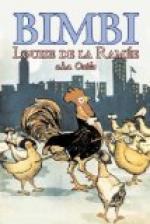He thought he had been moved on this truck many miles, but in truth the stove had been only taken from the railway station to a shop in the Marienplatz. Fortunately, the stove was always set upright on its four gilded feet, an injunction to that effect having been affixed to its written label, and on its gilded feet it stood now in the small dark curiosity shop of one Hans Rhilfer.
“I shall not unpack it till Anton comes,” he heard a man’s voice say; and then he heard a key grate in a lock, and by the unbroken stillness that ensued he concluded he was alone, and ventured to peep through the straw and hay. What he saw was a small square room filled with pots and pans, pictures, carvings, old blue jugs, old steel armor, shields, daggers, Chinese idols, Vienna china, Turkish rugs, and all the art lumber and fabricated rubbish of a bric-a-brac dealer’s. It seemed a wonderful place to him; but, oh! was there one drop of water in it all? That was his single thought; for his tongue was parching, and his throat felt on fire, and his chest began to be dry and choked as with dust.
There was not a drop of water, but there was a lattice window grated, and beyond the window was a wide stone ledge covered with snow. August cast one look at the locked door, darted out of his hiding-place, ran and opened the window, crammed the snow into his mouth again and again, and then flew back into the stove, drew the hay and straw over the place he entered by, tied the cords, and shut the brass door down on himself. He had brought some big icicles in with him, and by them his thirst was finally, if only temporarily, quenched. Then he sat still in the bottom of the stove, listening intently, wide awake, and once more recovering his natural boldness.
The thought of Dorothea kept nipping his heart and his conscience with a hard squeeze now and then; but he thought to himself, “If I can take her back Hirschvogel, then how pleased she will be, and how little ’Gilda will clap her hands!” He was not at all selfish in his love for Hirschvogel: he wanted it for them all at home quite as much as for himself. There was at the bottom of his mind a kind of ache of shame that his father—his own father—should have stripped their hearth and sold their honor thus.
A robin had been perched upon a stone griffin sculptured on a house eave near. August had felt for the crumbs of his loaf in his pocket, and had thrown them to the little bird sitting so easily on the frozen snow.
In the darkness where he was he now heard a little song, made faint by the stove-wall and the window glass that was between him and it, but still distinct and exquisitely sweet. It was the robin, singing after feeding on the crumbs. August, as he heard, burst into tears. He thought of Dorothea, who every morning threw out some grain or some bread on the snow before the church. “What use is it going there,” she said, “if we forget the sweetest creatures God has made?” Poor Dorothea! Poor, good, tender, much-burdened little soul! He thought of her till his tears ran like rain.




